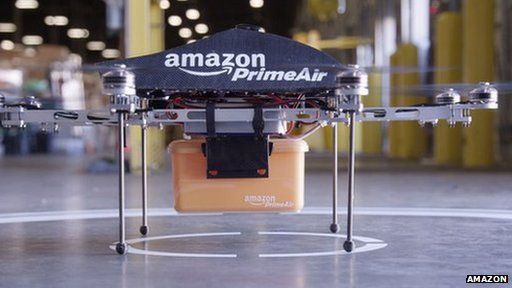Amazon seeks UK drone experts for delivery service
- Published

UK drone experts are being sought by Amazon to help with its fledgling drone-based delivery service.
Amazon's Prime Air will use small drones to deliver packages up to 2.3kg (5lb) in weight to customers within 30 minutes of an order being placed.
Drone testing will take place in Cambridge at a site Amazon acquired when it bought Evi Technologies.
Prime Air-related ads for engineers, software developers and scientists have now appeared on Amazon's jobs site.
The ads come as Imperial College unveils plans to create the UK's most advanced drone research lab.
Video capture
Amazon announced its plans to create Prime Air in December 2013 and said it might take five years for the service to actually start. Early work suggests it will use small octocopters to deliver packages.
Research on Prime Air was known to be under way in Seattle and the ads suggest this has now been expanded to include Cambridge, UK. The job adverts seek people with expertise in flying drones, a strong aeronautical engineering background or project management.
In a statement issued when it was quizzed about the ads, Amazon said: "We have multiple Prime Air development centres, including R&D labs in Seattle and Cambridge.
"We're always looking to add great talent to the team; the Cambridge-based Prime Air positions we have open are a reflection of that."
Other companies known to be developing drone-based delivery services include Google and DHL. During the summer, Google demonstrated its service using a fixed-wing craft and in September DHL started a regular drone-delivery service to an island in the North Sea.
Also this week Imperial College announced it was spending £1.25m to create a research lab and test arena to boost UK expertise in unmanned aerial vehicles.
Funded by cash from an Imperial alumnus, the two-storey lab will house a workshop fitted with 3D printers and micromachining equipment so researchers can quickly make and modify drones.
In addition, the lab will have a large enclosed arena where the devices can be tested by being flown or piloted through a pool.
High-speed cameras will film drones as they fly or swim to help engineers and scientists refine their creations.
"Ultimately, we are aiming to develop flying robots that could improve the way companies do business, save lives and help to protect our environment," said Dr Mirko Kovac, director of the new lab.
Air safety watchdogs in the UK and US limit where drones and other unmanned craft can be used.
In the UK, drone pilots must have a permit to operate one if the device is flying over people or close to buildings or if its pilot will profit from its operation.
Similarly, in the US commercial drone operators must get permission to fly their craft. However, the Federal Aviation Administration (FAA) recently relaxed its rules to allow six TV and film companies to use them after they filed detailed flight plans covering how and where they would be flown.
Despite the FAA rules, many photography, surveying and video firms are known to flout them and use the craft widely in their work.
- Published27 October 2014
- Published25 September 2014
- Published26 September 2014
- Published2 December 2013